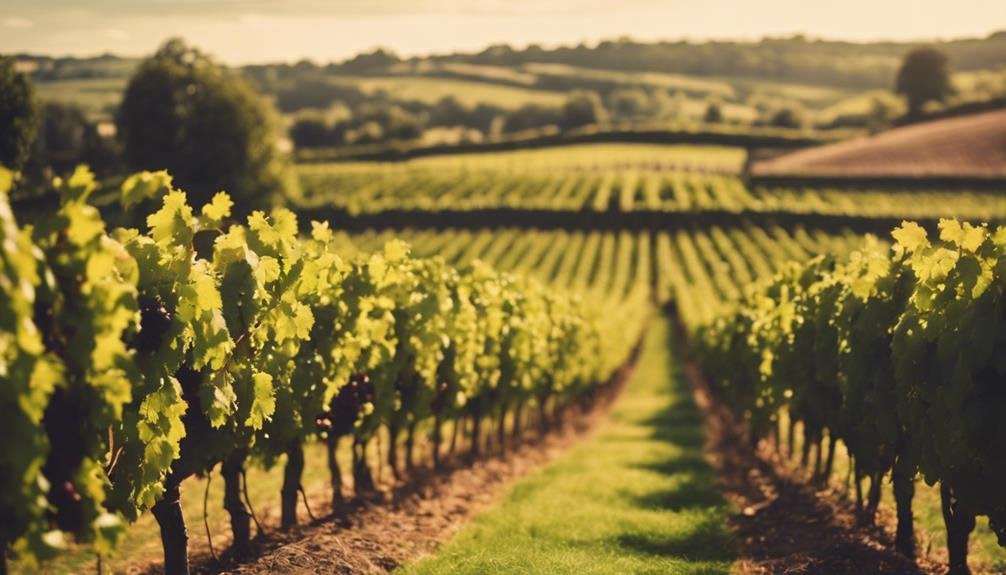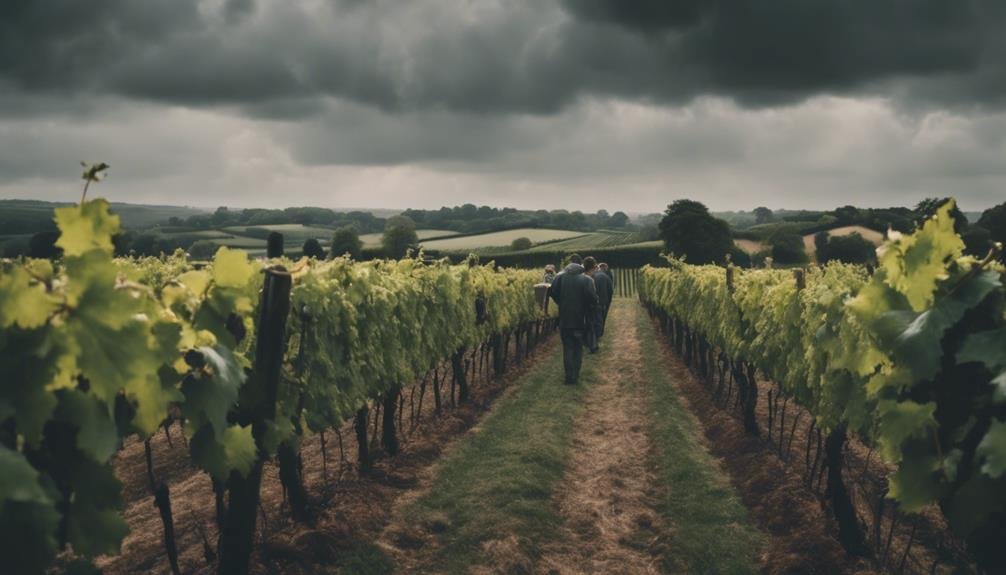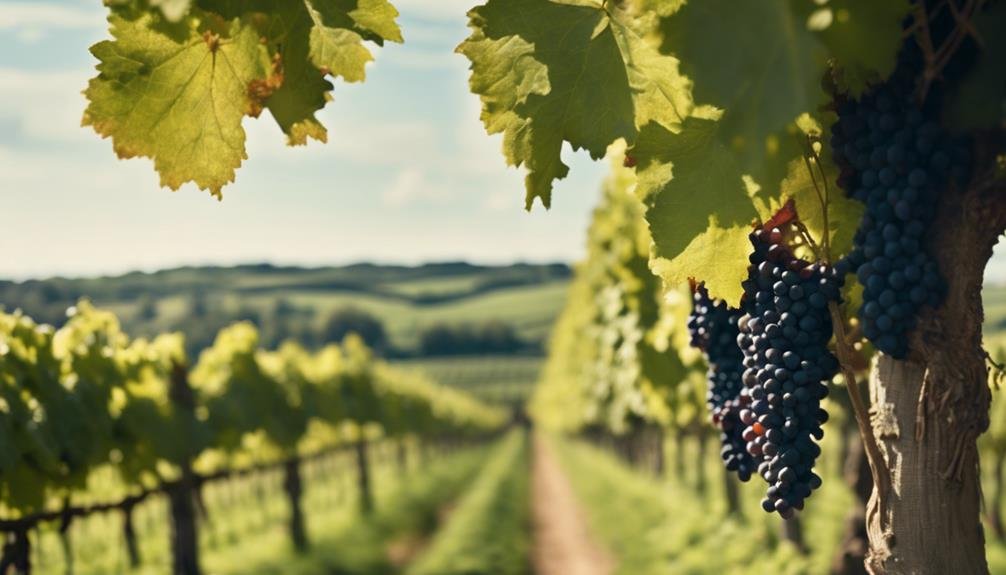The English wine industry is swiftly gaining global recognition due to increased demand and a reputation for quality. Emerging wine regions like Hampshire, East Anglia, and Surrey are contributing to its popularity. Traditional grape varieties such as Pinot Noir and Chardonnay play a significant role in shaping the industry's success. English wines are embracing innovative production techniques and focusing on excellence, particularly in sparkling varieties. Challenges like weather risks and sustainability are being addressed for future growth. The industry's potential to rival Champagne on the global stage marks an exciting journey of quality and innovation.
Growth of English Wine Exports
Experiencing a steady increase in demand and recognition on the global stage, the English wine industry has seen a notable surge in the exportation of its high-quality wines. This export market expansion has brought significant economic benefits to the industry, with English wines gaining popularity and acceptance worldwide.
The reputation of English wines for their quality and unique flavors has led to increased exports to various countries. The economic benefits derived from this expansion include enhanced revenue streams for English wine producers and a boost to the overall economy.
As English wines continue to make their mark in the global market, the industry is poised to reap further economic rewards, solidifying its position as a key player in the international wine trade.
Englands Emerging Wine Regions
With the English wine industry's rapid growth and increasing recognition, the emergence of new wine regions in England signifies a promising development in the country's viticulture landscape. England's expanding vineyard landscapes are now seeing regions beyond the traditional viticulture areas like Sussex, Kent, and Surrey gaining prominence. These emerging regions, such as Hampshire, East Anglia, South West England, and Surrey, are proving their climate suitability for grape cultivation. The varying terroirs in these regions offer unique characteristics that contribute to the diversity of English wines. Below is a table showcasing some of the emerging wine regions in England:
| Emerging Wine Regions | Location | Notable Features |
|---|---|---|
| Hampshire | South East England | Diverse soil types |
| East Anglia | East of England | Warmer microclimate |
| South West England | South West England | Maritime influence |
| Surrey | South East England | Sheltered vineyards |
Impact of Traditional Grape Varieties

The utilization of traditional grape varieties in English wine production plays a pivotal role in shaping the industry's quality and reputation on a global scale. Varietals like Pinot Noir, Chardonnay, and Pinot Meunier are commonly used in producing English sparkling wines, showcasing the influence of traditional grapes on the industry's success.
These grapes, along with others like Bacchus, Ortega, Seyval Blanc, and Reichensteiner, contribute to the unique flavors and characteristics of English wines. Viticultural practices tailored to these traditional grape varieties promote optimal growth and flavor development, further enhancing the quality of English wines.
Evolution of English Wine Trends
In the dynamic landscape of the English wine industry, significant shifts in consumer preferences and production techniques are defining the evolution of current wine trends.
Innovative winemaking techniques are increasingly being embraced, allowing producers to experiment with new varietals and styles. This trend is a departure from historical vineyard practices, where traditional grape varieties dominated.
English wine producers are now focusing on quality and excellence, with a particular emphasis on sparkling wines made using the traditional method. By combining modern innovations with a nod to the past, the English wine industry is carving out a unique identity in the global market.
This evolution showcases a harmonious blend of tradition and innovation, positioning English wines as exciting contenders in the world of winemaking.
Challenges and Future Prospects

Steering through weather-related risks and land price dynamics, the English wine industry is poised for a future that holds great promise and potential for growth. Weather risks such as disease and rot pose challenges to vineyards, requiring sustainable practices and innovative solutions. To guarantee a resilient future, sustainability initiatives are becoming increasingly crucial within the industry. By addressing these challenges head-on and investing in sustainable practices, English winemakers can continue to develop and thrive in a competitive global market. The table below highlights key aspects of the challenges and future prospects facing the English wine industry.
| Challenges | Sustainability Initiatives | Future Prospects |
|---|---|---|
| Weather-related risks | Implementing sustainable | Potential to rival |
| viticulture practices | Champagne | |
| Land price dynamics | Adopting eco-friendly | Development and growth |
| farming methods | of the industry |
Frequently Asked Questions
How Are English Winemakers Adapting to Climate Change Challenges?
English winemakers are adapting to climate change challenges through innovative soil management practices, refined irrigation techniques, grape varietal experimentation, and strategic harvest timing. These adjustments guarantee resilience against weather risks and promote sustainable vineyard practices.
What Unique Grape Varieties Are Gaining Popularity in English Wines?
Emerging blends and experimental varietals are gaining popularity in English wines. New terroirs offer unique characteristics, while organic trends drive innovation. English winemakers are diversifying grape varieties to adapt to changing climates, enhancing the industry's growth and appeal.
Are There Any Sustainable Practices Being Implemented in English Vineyards?
In English vineyards, sustainable practices like organic farming and eco-friendly initiatives are gaining traction. Biodiversity conservation and green initiatives are being embraced to guarantee environmentally conscious grape cultivation, showcasing a commitment to responsible viticulture.
How Are English Wineries Incorporating Technology Into Their Winemaking Processes?
English wineries are embracing technology through AI-assisted fermentation monitoring and precision viticulture techniques. This integration optimizes production processes, enhances grape quality, and guarantees consistency. Such advancements showcase a commitment to innovation and quality in winemaking practices.
What Initiatives Are in Place to Promote Tourism at English Vineyards?
Vineyards in England have embraced wine tasting and vineyard tours to promote tourism. These initiatives provide visitors with immersive experiences, showcasing the beauty of the vineyards, the winemaking process, and the opportunity to sample exquisite English wines.
Conclusion
To sum up, the English wine industry is like a flourishing vineyard, steadily growing and reaching new heights on the global stage. With a focus on traditional method sparkling wines and a reputation for excellence, English winemakers are making waves in the industry.
Despite challenges like weather risks and climate change, the future looks bright for the sector with increasing exports and competitive pricing. The English wine industry is poised for further expansion and success.
